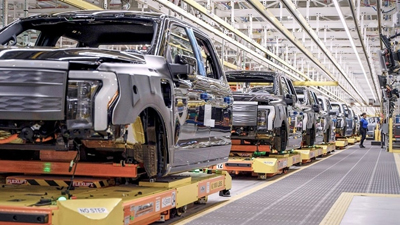The United Auto Workers (UAW) union has lowered its wage demands ahead of a potential strike and after the union rejected contract offers from Ford, General Motors (GM) and Stellantis.
After rejecting offers from the Big 3 on Sept. 8, the UAW has lowered its pay raise demands to within the middle of the 30% range, according to a person familiar in a report from Automotive News on Sept. 11. The UAW’s latest wage demand includes a drop to as low as 36%, which would be paid out over the next four years.
The news comes after UAW President Shawn Fain kept to wage demands of more than 40% for more than a month. It also comes just days before a Sept. 14 deadline for the previous union contracts, with the UAW threatening a major strike if demands are not met.
Wage increases of 14.5%, 10% and 9% over four years were offered by Stellantis, GM and Ford, respectively. Since then, however, Ford has proposed a 16% wage increase over the four years. The automaker has also proposed decreasing the time it takes new workers to earn top wages to five years, down from six in its previous contract.
GM was expected to put forth another counteroffer over the weekend, while Stellantis said it planned to do the same Sept. 11. It isn’t clear at the time of writing what changes these offers include.
“We are on a good path and remain committed to reaching a tentative agreement without a work stoppage that would negatively impact our employees and our customers,” wrote Tobin Williams, Stellantis North America’s senior vice president of human resources, in an email to workers.
As Automotive News pointed out, the decrease also showed Fain and the UAW may be willing to compromise, as the situation remains open-ended. However, if the contract deadline passes, a strike could be imminent. The current union contracts expire at 11:59 p.m. ET Sept. 14.
In an update Sept. 11, Fain said the UAW is “ready to negotiate in Detroit 24/7, just as we have been for the past seven weeks since we gave them our members demands.
“Despite receiving no response for over a month, when the CEOs are ready to make a serious offer we’ll be there, day or night," Fain said. "It’s unfortunate the companies have waited until the last moments to get focused on the needs of 150,000 autoworkers, our families and our communities.”










Abby Andrews